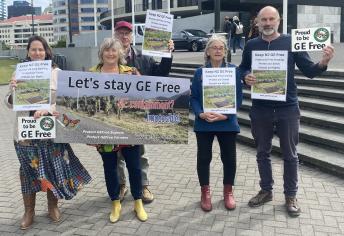Gene Technology Bill
The Gene Technology Bill Hearing and Update.
The Gene Technology Bill 2025 report back to the Health Select Committee will be on June 17, this has now been postponed until the 31 July, This has now been postponed until the 22nd August.
The Final Health Select Committee hearing on the Gene Technology Bill was heard on the 2 April.
The Gene Technology Bill received 15000 submission. 900 people asked to be heard and 400 were selected to present to the Health Select Committee (HSC). The full day Gene Technology Bill completed hearings are up on the Health Select committee website a day after the hearing. (https://vimeo.com/showcase/10758257).
The first day, March 5th 2025, the full Health Select Committee heard the majority of submitters who supported the Bill. In the days of 10, 14 and 17 March the HS Committee split into 2 subcommittees A&B, so they could fast track the process. Many submitters opposed the proposed Bill and called for it to be withdrawn. If this was not possible than major amendments must be made on ethical and precautionary grounds restoring the right of Local and Regional councils to place precautionary policies on GE. This Bill purports to resemble the Australian Gene Technology Act, however submitters pointed out that there are so many omissions on precaution that it in fact is the most permissive Bill in the World. It undermines sustainability and threatens the growing organic and regenerative farming businesses and our export markets.
Why Oppose the Gene Technology Bill? This bill undermines protections for our environment, economy, and communities by:
- Ignoring the Protective Precautionary Principle: Risks to ecosystems and rural jobs are not protected.
- Excluding Treaty of Waitangi Principles: Disregards Māori rights and perspectives.
- Denying Consumer choice - no labelling, GE contamination through unprotected genetic drift.
- Shifting Liability: No requirement for GE users to manage risks. Genetic drift clean up is at the cost of the contaminated party.
- No Supply Chain Segregation: Farmers lose the ability to preserve the integrity of GE-free crops.
- No Labelling: Consumers and farmers won’t know be able to choose which products are GE-Free.
- No Ethical Standards: Overlooks animal welfare and ethical concerns.
- Ignoring Economic Risks: The value of New Zealand’s non-GMO exports is at stake.
- Ignoring Reputation Risks: Deregulation threatens New Zealand’s global reputation for clean, safe, GMO-free food, jeopardising a key competitive advantage.
Other Concerning Changes:
-
Removes local councils’ ability to enforce GE-free regions or protections under the RMA.
-
Deregulates GE techniques like gene editing and synthetic biology.
-
Creates a biotech business-focused body, replacing the robust HSNO Act safeguards.
-
Re Defines the term for genetically engineered organisms calling them "regulated organisms," removing transparency around GE.
-
Allows unlabelled, untested GE seed, plants, microorganisms (SDN1, SDN2) into NZ. These products, once released, are irreversible and can spread through natural pollination.
Your Voice Matters!
Let’s work together to protect our GE-Free status and safeguard New Zealand’s future!
Background resources -
Centre for Integrated Research in Biosafety School of Biological Sciences submission to Health Select Committee
New Zealand Legislation
Gene Technology Bill - Explanatory note -General policy statement
Assessments of the GT Bill
GE Free NZ press releases on the Gene Technology Bill
NZ's Rush To Push New Gene-Editing Laws – A Hidden Risk For Our Future? Prof. Jack Heinemann: Director Of Centre For Integrated Research In Biosafety.
NZ’s New Gene Tech Bill Under Fire, GE Free NZ’s Battle With Delayed OIA’'s: Legal Hub: With Katie Ashby-Koppens. Excellent interview (1-16mins)
Potential costs of regulatory changes for Gene Technology: Economic assessments of an MBIE proposal. (2024) New Zealand Institute of Economic Research (NZIER) report estimates that the loss of NZ GE Free status in export demand would be between $10-$20 billion.
Why GE Crops Can Never Coexist With Non-GE Crops – With Evidence Of Contamination In Europe. Claire Bleakley: President Of GE Free NZ (2024)
GENETIC ENGINEERING PANEL NZ's Gene Technology Bill - Rushed Reform Or Reckless Revolution? The Fight For Food Transparency: Guy Hatchard, Jodie Bruning, & Jon Carapiet (2024).
The Govt's Removal Of Environmental Safeguards For GMO Trials And Judith Collins' Recent Comments Prof Jack Heinemann: Centre For Integrated Research In Biosafety Director (2024)
Keep Aotearoa NZ GE Free Ceres Organics submission guide.
OANZ GE Free Future Activation Toolkit.
Dr Guy Hatchard has made a video on YouTube "The Gene Technology Bill—What Kiwis Need To Know" and a template with more ideas for submitters on the submission template
Ministry of Business, Innovation and Employment (MBIE) information
Comparison between HSNO Act and proposed Gene Technology Bill
Science Media Centre -
Gene Technology Bill introduced to parliament – Expert Reaction - conflict of interest declared as many had a hand in writing the GT Bill as well as benefiting from biotechnology patents and funding.



